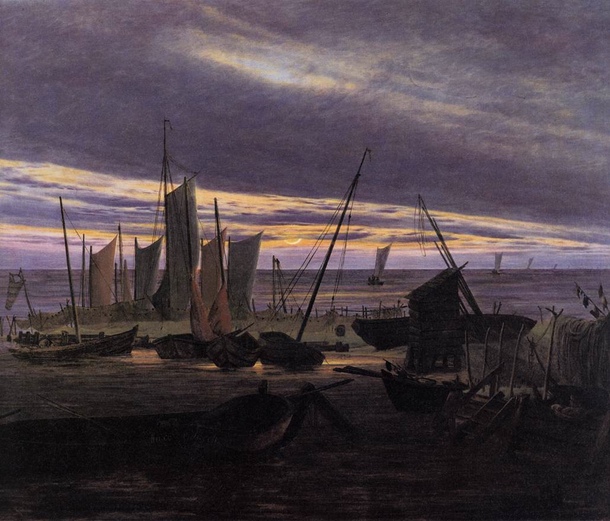
Vor seiner Hütte ruhig im Schatten sitzt
Der Pflüger, dem Genügsamen raucht sein Herd.
Gastfreundlich tönt dem Wanderer im
Friedlichen Dorfe die Abendglocke.
Wohl kehren itzt die Schiffer zum Hafen auch,
In fernen Städten fröhlich verrauscht des Markts
Geschäftiger Lärm; in stiller Laube
Glänzt das gesellige Mahl den Freunden.
Wohin denn ich? Es leben die Sterblichen
Von Lohn und Arbeit; wechselnd in Müh und Ruh
Ist alles freudig; warum schläft denn
Nimmer nur mir in der Brust der Stachel?
Am Abendhimmel blühet ein Frühling auf;
Unzählig blühen die Rosen, und ruhig scheint
Die goldene Welt; o dorthin nehmt mich,
Purpurne Wolken! und möge droben
In Licht und Luft zerrinnen mir Lieb und Leid’!
Doch, wie verscheucht von törichter Bitte, flieht
Der Zauber; dunkel wird’s und einsam
Unter dem Himmel, wie immer, bin ich –
Komm du nun, sanfter Schlummer! zu viel begehrt
Das Herz; doch endlich Jugend! verglühst du ja,
Du ruhelose, träumerische!
Friedlich und heiter ist dann das Alter.
Before his hut, quietly in the shadows
Sits the ploughman, contentedly, his hearth smoking
The evening bell tolls a welcome
To the peaceful village.
Now the boatmen too turn harbor-ward,
In distant cities the happy sounds
of the marketplace settle down; in quiet greenery
glitters a sociable repast among friends.
Whither shall I go? Mortals live
By labor and wage, alternating labor and rest
And all is happiness; why then is it
That in me alone the thorn allows no repose?
In the evening sky Spring’s bloom opens up;
The roses bloom innumerably and the golden world
Seems at peace; transport me thence,
Purple clouds! And may above
My love and passion melt into light and air! –
But my foolish request causes
The magic to flee; darkness falls and alone
beneath the heavens, as ever, I remain –
Come now, soft sleep! For too much does my heart
Yearn; but in the end, youth smolders too
Restless, dreamy! Then comes
Old age, serene and peaceful.
—Friedrich Hölderlin, Abendphantasie (1799) first published in the Britischer Damenkalender und Taschenbuch für das Jahr 1800 (1799) in Sämtliche Werke und Briefe, vol. 1, pp. 237-38 (G. Mieth ed. 1970)(S.H. transl.)
As Julian Young noted in his recent Nietzsche biography, this was one of Nietzsche’s favorite poems and a work which exercised some influence over Nietzsche’s early thought. A wonderful setting of this poem exists by Paul Hindemith, as yet unavailable on YouTube. Listen to Clara Haskil performing Franz Schubert’s Sonata No. 16 in A Minor (DV 845)(1825):


